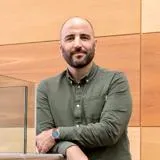
Dr Alberto Elosegui-Artola
Lecturer in Biophysics
Biography
Alberto Elosegui-Artola is a lecturer in Biophysics in the Department of Physics, King’s College London. Alberto is also a Physical Sciences Group Leader at the Francis Crick Institute, where he leads the Cell and Tissue Mechanobiology Laboratory. His lab seeks to understand how physical properties and biochemical cues work together to regulate biological functions.
Alberto obtained a PhD in Biomedical Engineering from the University of Navarra (Spain) in 2012. After graduation, he moved to Barcelona to the laboratory of Pere Roca-Cusachs at IBEC to pursue his postdoctoral studies. During this time, he contributed to the identification of novel molecular mechanisms that explains how cells sense and respond to mechanical properties.
In 2017, he was funded with a Marie-Skłodowska Curie fellowship to continue his research training in David J. Mooney’s laboratory at Harvard University. Here, he examined the influence of the extracellular matrix viscoelasticity in cell and tissue response.
In 2021, he was awarded an ERC Starting Grant and started his lab at the Francis Crick Institute in a joint appointment with the Physics Department at King's College London. He integrates physics, engineering and biology to study the role of mechanics in living tissues.
Research
Cells in tissues are in constant communication with other cells and with the material surrounding them, called the extracellular matrix. Through these communications, they receive physical and chemical signals that control how the tissue behaves. We want to understand how the interplay between physical properties and biochemical stimuli regulate biological function at the molecular, cellular and tissue level.
To do this, we combine a range of methods and approaches from molecular biology, engineering, biophysics, microscopy and computational modelling.
By carefully studying the three-dimensional interactions between cells and the extracellular matrix, we aim at understanding the mechanisms that cells use to sense and respond to physical stimuli and trigger other processes. We study how these mechanisms are regulated in healthy tissue and during development, and how they can be derailed in diseases like cancer.
More Information
Research

The Francis Crick Institute
King’s is delighted to be a founding academic partner alongside UCL and Imperial College in the Francis Crick Institute, joining the multidisciplinary research expertise from all the Partners together to deliver world-leading biomedical research.

King’s MechanoBiology Centre (KMBC)
The King’s MechanoBiology Centre gives a common platform for researchers across different disciplines with complementary interests in mechanobiology
Research

The Francis Crick Institute
King’s is delighted to be a founding academic partner alongside UCL and Imperial College in the Francis Crick Institute, joining the multidisciplinary research expertise from all the Partners together to deliver world-leading biomedical research.

King’s MechanoBiology Centre (KMBC)
The King’s MechanoBiology Centre gives a common platform for researchers across different disciplines with complementary interests in mechanobiology
